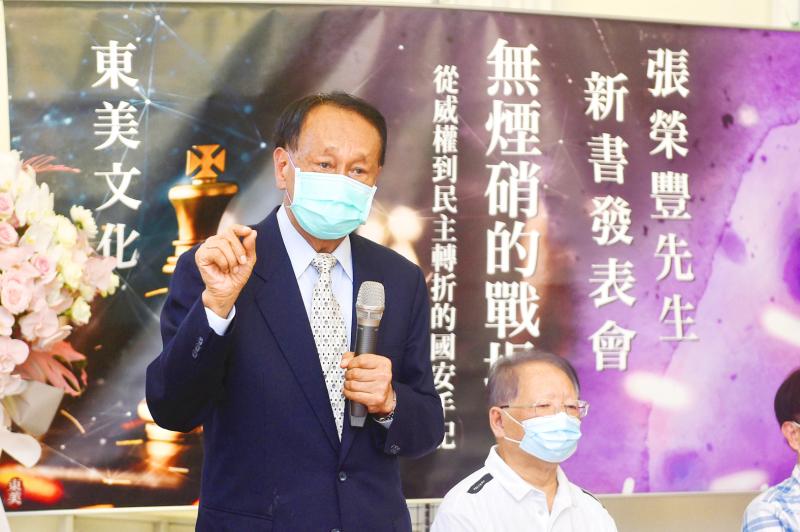The four-month conscription rule aimed at wooing young voters was a ridiculous move on the part of Taiwan’s two largest political parties, former National Security Council (NSC) secretary-general Ting Yu-chou (丁渝洲) said on Sunday.
Former US secretary of defense Mark Esper, while visiting Taiwan last week, said that military service for conscripts should be extended to one year and women should be included in the program.
Taiwanese men had to serve two to three years in the military as part of a conscription system adopted by the Republic of China government after it relocated to Taiwan in 1949. Conscription was reduced to one year in 2008.

Photo: George Tsorng, Taipei Times
During former Chinese Nationalist Party (KMT) president Ma Ying-jeou’s (馬英九) administration, the government announced that joining the armed forces would be voluntary and conscripts would only be required to undergo four months of military training, starting in 2013.
The policy has continued under the Democratic Progressive Party, which came into power in 2016.
The nation’s military is mainly a volunteer force now, with conscripts serving a supporting role.
“Shortening the conscription not only reduced the military strength of active-duty soldiers, but also paralyzed the strength of the reserve forces,” Ting said on Sunday at a book launch by former NSC deputy secretary-general Chang Jung-feng (張榮豐) in Taipei.
Ting served as head of the NSC from August 2001 to March 2002 under former president Chen Shui-bian (陳水扁), and was head of the National Security Bureau and Ministry of National Defense’s Military Intelligence Bureau under former president Lee Teng-hui (李登輝).
The world is paying attention to cross-strait issues and some countries have even listed Taiwan as one of the most dangerous regions in the world, Ting said.
He said that he had never been afraid of war when he served in the military, but is becoming more fearful of it after his retirement.
The Chinese military has grown at a fast pace over the past two decades, Ting said, adding that the gap between Taiwan’s and China’s military forces is widening.
Even if Taiwan were powerful enough to defeat China, it should avoid war, because it would harm its citizens, he added.
In addition to strengthening its military forces, Taiwan should focus on “soft strategies,” using diplomatic, psychological, economic and technological measures to safeguard the country, he said.
“Protecting the country’s best interests is an expression of love for Taiwan,” he added.
Additional reporting by CNA

DAREDEVIL: Honnold said it had always been a dream of his to climb Taipei 101, while a Netflix producer said the skyscraper was ‘a real icon of this country’ US climber Alex Honnold yesterday took on Taiwan’s tallest building, becoming the first person to scale Taipei 101 without a rope, harness or safety net. Hundreds of spectators gathered at the base of the 101-story skyscraper to watch Honnold, 40, embark on his daredevil feat, which was also broadcast live on Netflix. Dressed in a red T-shirt and yellow custom-made climbing shoes, Honnold swiftly moved up the southeast face of the glass and steel building. At one point, he stepped onto a platform midway up to wave down at fans and onlookers who were taking photos. People watching from inside

A Vietnamese migrant worker yesterday won NT$12 million (US$379,627) on a Lunar New Year scratch card in Kaohsiung as part of Taiwan Lottery Co’s (台灣彩券) “NT$12 Million Grand Fortune” (1200萬大吉利) game. The man was the first top-prize winner of the new game launched on Jan. 6 to mark the Lunar New Year. Three Vietnamese migrant workers visited a Taiwan Lottery shop on Xinyue Street in Kaohsiung’s Gangshan District (崗山), a store representative said. The player bought multiple tickets and, after winning nothing, held the final lottery ticket in one hand and rubbed the store’s statue of the Maitreya Buddha’s belly with the other,

‘NATO-PLUS’: ‘Our strategic partners in the Indo-Pacific are facing increasing aggression by the Chinese Communist Party,’ US Representative Rob Wittman said The US House of Representatives on Monday released its version of the Consolidated Appropriations Act, which includes US$1.15 billion to support security cooperation with Taiwan. The omnibus act, covering US$1.2 trillion of spending, allocates US$1 billion for the Taiwan Security Cooperation Initiative, as well as US$150 million for the replacement of defense articles and reimbursement of defense services provided to Taiwan. The fund allocations were based on the US National Defense Authorization Act for fiscal 2026 that was passed by the US Congress last month and authorized up to US$1 billion to the US Defense Security Cooperation Agency in support of the

‘COMMITTED TO DETERRENCE’: Washington would stand by its allies, but it can only help as much as countries help themselves, Raymond Greene said The US is committed to deterrence in the first island chain, but it should not bear the burden alone, as “freedom is not free,” American Institute in Taiwan Director Raymond Greene said in a speech at the Institute for National Defense and Security Research’s “Strengthening Resilience: Defense as the Engine of Development” seminar in Taipei yesterday. In the speech, titled “Investing Together and a Secure and Prosperous Future,” Greene highlighted the contributions of US President Donald Trump’s administration to Taiwan’s defense efforts, including the establishment of supply chains for drones and autonomous systems, offers of security assistance and the expansion of